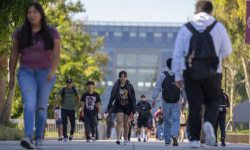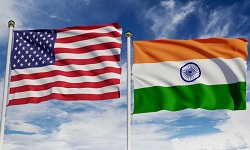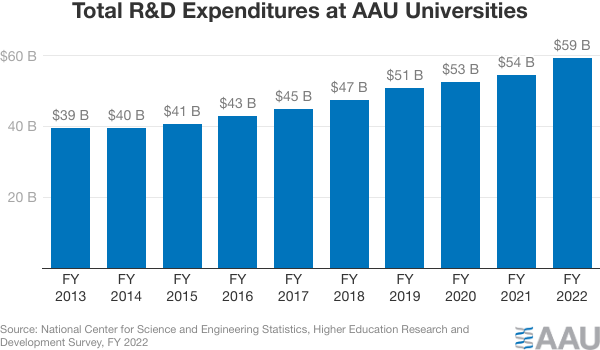 College Enrollment Ticks Up for the First Time Since the Pandemic
College Enrollment Ticks Up for the First Time Since the Pandemic
The National Student Clearinghouse Research Center released new data last week showing that undergraduate enrollment in the United States grew 1.2% (an increase of 176,000 students) in fall 2023 compared to fall 2022. This is the first time undergraduate enrollment has grown since the pandemic. The growth is driven largely by increases in the number of students attending community colleges, where enrollment grew by 2.6%; enrollment at four-year public and private nonprofit colleges increased by 0.6%. Despite the year-over-year increase in enrollment, the total number of undergraduate students enrolled in college in the 2023-24 academic year (15.2 million) is still a million less than before the pandemic.
First-year student enrollment also grew at a much slower rate (+0.8%) than overall undergraduate student enrollment. Community colleges again drove increases in first-year student enrollment (+2.3%); students 21 years or older also enrolled in college as freshmen at higher rates (+6.3%) in fall 2023 compared to the previous year. According to the center, however, “There was no growth among freshmen 20 years old and younger. Their enrollment remains 5.3 percent below 2019 levels.”
 AAU Task Force on Expanding U.S.-India University Partnerships Releases Final Report
AAU Task Force on Expanding U.S.-India University Partnerships Releases Final Report
The AAU Task Force on Expanding U.S.-India University Partnerships released its final report last week, containing recommendations on how the United States and India can expand meaningful research and educational collaborations between each nation’s universities. The final report builds on the task force’s interim report, issued last June.
The final report provides additional recommendations to help create partnerships between U.S. and Indian research universities and provides details regarding the Indo-U.S. Global Challenges Institute. Last fall, AAU and the Council of Indian Institutes of Technology signed a memorandum of agreement to establish, and seek support for, the joint institute. As the final report notes, “The Institute will be a virtual network of U.S. and Indian institutions that will focus on facilitating and coordinating new research collaborations on both individual and institutional levels in five high-impact areas of mutual interest.” It will also “serve as a hub for both leveraging existing projects and generating new cooperative arrangements.” The Institute’s efforts will be guided by a governing council to be established in 2024.
 Nine AAU Presidents Join Initiative to Advance Civic Preparedness in College
Nine AAU Presidents Join Initiative to Advance Civic Preparedness in College
Vanderbilt University Chancellor Daniel Diermeier is the latest to join a group of university presidents focused on advancing civic preparedness on college campuses. The College Presidents for Civic Preparedness initiative, convened by the Institute for Citizens and Scholars, brings together leaders of 25 universities “committed to addressing the challenge of ensuring today’s young people are well-informed, productively engaged, and committed citizens.”
Begun in fall 2023, the initiative recognizes that colleges play a key role in fostering democracy, providing civic education, and creating opportunities for students “to develop skills, habits, practices, and norms for living in a pluralistic society.” One of the major projects of the initiative is the Campus Call for Free Expression, which supports campus activities that create dialogue across differences and help students learn about the value of free speech. “More than ever, the world needs college graduates who can engage productively with people they might not agree with,” said Chancellor Diermeier. “I am delighted to join College Presidents for Civic Preparedness and know that the perspectives of my fellow university leaders will help inform not only what we do at Vanderbilt, but how we as a nation prepare the next generation of workers, leaders, and innovators,” he added.
Other AAU presidents who are part of the initiative include Cornell University President Martha Pollack, Dartmouth College President Sian Beilock, Duke University President Vincent Price, Johns Hopkins University President Ron Daniels, Purdue University President Mung Chiang, Rutgers University President Jonathan Holloway, University of Notre Dame President Rev. John Jenkins, and University of Pittsburgh Chancellor Joan Gabel.
 Arizona State University Partners with OpenAI
Arizona State University Partners with OpenAI
Last week, Arizona State University became the first institution of higher education to collaborate with OpenAI, the artificial intelligence company behind ChatGPT. The partnership will give ASU access to ChatGPT Enterprise, which is designed for use by institutions and businesses. “ASU recognizes that augmented and artificial intelligence systems are here to stay, and we are optimistic about their ability to become incredible tools that help students to learn, learn more quickly and understand subjects more thoroughly,” said ASU President Michael M. Crow in a statement.
Initially, faculty and staff will have to request access to ChatGPT Enterprise. The university said that, starting next month, faculty and staff at ASU will be able to submit proposals on how they plan to implement ChatGPT Enterprise in their work. ASU Chief Information Officer Lev Gonick said that the university’s goal is “to develop AI-driven projects aimed at revolutionizing educational techniques, aiding scholarly research, and boosting administrative efficiency.”
AAU, Associations Submit Comments on National Science Foundation’s Plan to Improve Public Access to Research
AAU joined the Association of Public and Land-grant Universities and the Council on Governmental Relations in submitting comments earlier this month on the National Science Foundation’s request for information on implementing the agency’s Public Access Plan 2.0: Ensuring Open, Immediate, and Equitable Access to National Science Foundation Funded Research. The plan updates the agency’s current requirements for public access to NSF-funded research in response to a memorandum issued by the White House Office of Science and Technology Policy in 2022.
The associations praised the NSF’s plan for its “positive contributions” to advancing “public access to research data and publications,” but expressed concerns about its lack of clarity regarding “data for juried conference proceedings” and its “definitions of scientific data and metadata.” The associations also asked the agency to consider the undue burdens its public access and data sharing requirements would place on researchers and institutions and to ensure that it includes sufficient funds in its research grants to enable researchers and institutions meet the costs of complying with public access requirements.
“Public access to federally funded research is crucial for rigorous science, discovery, and reproducibility, and research universities are committed to sharing the results of their research whenever appropriate,” the associations noted.
News of Interest
The Washington Post: In Reversal, Education Dept. to Update Income Formula for Latest FAFSA – The Department of Education announced that it has adjusted this year’s Free Application for Federal Student Aid (FAFSA) to protect “more of a family’s earnings from the formula that determines how much aid a student can receive.” According to the agency, the change “will grant students access to an additional $1.8 billion in federal student aid.”
WNDU: Notre Dame Receives $100M Gift for Poverty Initiative – The University of Notre Dame is launching a “university-wide effort to fight poverty” through its Notre Dame Poverty Initiative. The initiative, made possible by a $100 million alumni gift, “will allow the university to serve as a leading institution for poverty research, giving students opportunities to fight poverty.”
The New York Times: To Slash Carbon Emissions, Colleges Are Digging Really Deep – Princeton University has been digging holes deep into its campus grounds to install a new geoexchange heating and cooling system that will help the university significantly cut its carbon emissions. The system draws out heat from buildings during hot months, stores it in underground water pipes, and then brings the heat back up in cold months to warm buildings. Universities across the country, including Dartmouth College, Cornell University, Brown University, and Columbia University are testing similar systems on their campuses.
Deseret News: The Magic Behind the High-Impact Discoveries from Utah’s Universities – In an opinion essay, University of Utah President Taylor Randall and Utah State University President Elizabeth R. Cantwell argue that undergraduate research opportunities at the two universities enrich students’ educational experiences and benefit Utah by “adding talent” to its workforce. “Utah’s future as a leader in technology, energy, biomedical science and education depends on training tomorrow’s workers and researchers and incentivizing them to stay in state,” they wrote, adding: “Undergraduate research at Utah’s R1 institutions is key in accomplishing this goal.”
USA Today: Biden Administration Cancels Another $5 Billion in Student Loan Debt – The Department of Education announced earlier this month that it is cancelling an additional $4.9 billion in student loan debt for close to 74,000 borrowers. The administration’s plan designated $1.7 billion to cancel debt for individuals in income-driven repayment plans and another $3.2 billion through the Public Service Loan Forgiveness program.
Inside Higher Ed: Republicans Focus on Affordability, Accountability in Higher Ed Overhaul – House Republicans recently introduced the College Cost Reduction Act containing numerous proposals that, if implemented, would make sweeping changes to higher education. Among other things, the bill would require colleges to pay back a portion of their students’ unpaid student loan debt and roll back several regula
Featured Research

Slow the Scroll: Users Less Vigilant About Misinformation on Mobile Phones
A new study by researchers from the Pennsylvania State University, the University of Florida, and Elon University finds that while “people process information more efficiently” on mobile phones, they also “tend to be less vigilant about misinformation” on these devices compared to personal computers. Meanwhile, the researchers found that PC users “are more likely to click on malicious links in phishing e-mails.”

Are Bugs Bugging Humans or the Other Way Around? Study Reveals Surprises
Insects and spiders play a key role in maintaining healthy ecosystems. Researchers at the University of Southern California collected insects and spiders from traps around Los Angeles to study which factors affect their presence. The research “points to ways homeowners, landscapers, and urban planners can ensure a healthy mix of these small but vital neighbors.”
Stat of the Week

Total R&D Expenditures at AAU Universities
AAU universities are the biggest investors in research and development among all colleges and universities in the United States, according to a report released in November by the National Science Foundation’s National Center for Science and Engineering Statistics. In FY22, AAU universities spent $59 billion on research and development, representing 57% of all spending ($97.8 billion) by academic institutions in the United States.